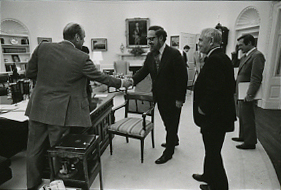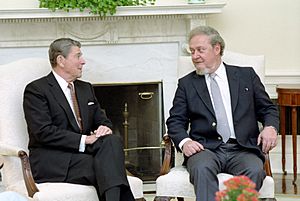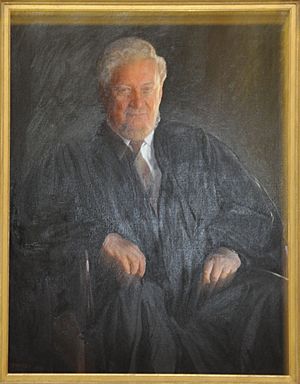Robert Bork facts for kids
Quick facts for kids
Robert Bork
|
|
|---|---|
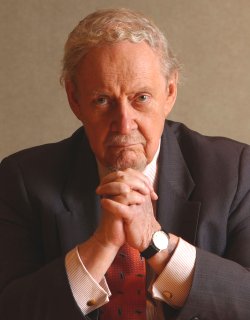
Bork in 2005
|
|
| Judge of the United States Court of Appeals for the District of Columbia Circuit | |
| In office February 9, 1982 – February 5, 1988 |
|
| Appointed by | Ronald Reagan |
| Preceded by | Carl E. McGowan |
| Succeeded by | Clarence Thomas |
| United States Attorney General | |
| Acting October 20, 1973 – January 4, 1974 |
|
| President | Richard Nixon |
| Preceded by | Elliot Richardson |
| Succeeded by | William B. Saxbe |
| 35th Solicitor General of the United States | |
| In office March 21, 1973 – January 20, 1977 |
|
| President | |
| Preceded by | Erwin Griswold |
| Succeeded by | Wade H. McCree |
| Personal details | |
| Born |
Robert Heron Bork
March 1, 1927 Pittsburgh, Pennsylvania, U.S. |
| Died | December 19, 2012 (aged 85) Arlington, Virginia, U.S. |
| Resting place | Fairfax Memorial Park |
| Political party | Republican |
| Spouses |
|
| Children | 3 |
| Education | University of Chicago (AB, JD) |
| Military service | |
| Allegiance | |
| Branch/service | |
| Rank | |
| Battles/wars | Korean War |
Robert Heron Bork (March 1, 1927 – December 19, 2012) was an American jurist who served as the solicitor general of the United States from 1973 until 1977. A professor at Yale Law School by occupation, he later briefly served as the acting U.S. attorney general and a judge on the U.S. Court of Appeals for the D.C. Circuit from 1982 to 1988. In 1987, President Ronald Reagan nominated Bork to the U.S. Supreme Court, but the Senate rejected his nomination after a highly publicized confirmation hearing.
Bork was born in Pittsburgh, Pennsylvania, and received both his undergraduate and legal education at the University of Chicago. After working at the law firms of Kirkland & Ellis and Willkie Farr & Gallagher, he served as a professor at Yale Law School. He became a prominent advocate of originalism, calling for judges to adhere to the original understanding of the United States Constitution. He also became an influential antitrust scholar, arguing that consumers often benefited from corporate mergers and that antitrust law should focus on consumer welfare rather than on ensuring competition. Bork wrote several notable books, including a scholarly work titled The Antitrust Paradox and a work of cultural criticism titled Slouching Towards Gomorrah.
From 1973 to 1977, he served as Solicitor General under President Richard Nixon and President Gerald Ford, successfully arguing several cases before the Supreme Court. During the October 1973 Saturday Night Massacre, Bork became acting U.S. Attorney General after his superiors in the U.S. Justice Department chose to resign rather than fire Special Prosecutor Archibald Cox, who was investigating the Watergate scandal. Following an order from the President, Bork fired Cox, his first assignment as Acting Attorney General. Bork served as Acting Attorney General until January 4, 1974, and was succeeded by Ohio U.S. Senator William B. Saxbe.
In 1982, President Reagan appointed Bork to the Court of Appeals for the District of Columbia Circuit. In 1987, Reagan nominated Bork to the Supreme Court after Justice Lewis Powell announced his retirement. His nomination precipitated unprecedented media attention and efforts by interest groups to mobilize opposition to his confirmation, primarily due to his criticisms of the Warren and Burger courts' interpretations of the Constitution, especially of the First Amendment and the constitutional right to privacy, and his role in the Saturday Night Massacre. His nomination was ultimately rejected in the Senate, 42–58. The Supreme Court vacancy was eventually filled by another Reagan nominee, Anthony Kennedy. Bork subsequently resigned from his judgeship on the D.C. Circuit in 1988 and served as a professor at various institutions, including the George Mason University School of Law. He also advised presidential candidate Mitt Romney and was a fellow at the American Enterprise Institute and the Hudson Institute prior to his death in 2012.
Contents
Early life and education
Bork was born on March 1, 1927, in Pittsburgh, Pennsylvania. His father, Harry Philip Bork Jr. (1897–1974), was a steel company purchasing agent, and his mother, Elizabeth (née Kunkle; 1898–2004), was a schoolteacher. He was an only child. His father was of German and Irish ancestry, while his mother was of Pennsylvania German descent.
Bork attended the Hotchkiss School in Lakeville, Connecticut, then attended the University of Chicago. He was a member of the international social fraternity Phi Gamma Delta, and graduated with a Bachelor of Arts in 1948. He then attended the University of Chicago Law School, where he was an editor of the University of Chicago Law Review. He graduated in 1953 with a Juris Doctor and membership in Order of the Coif and Phi Beta Kappa. While in law school, Bork took a two-year leave of absence to serve in the U.S. Marine Corps during the Korean War.
Academic career
After law school, Bork spent another year in military service, then entered private practice in 1954 as an associate at the law firm Kirkland & Ellis and Willkie Farr & Gallagher. In 1962, Bork left private practice and joined the faculty of Yale Law School as a professor. He taught at Yale until 1981, with a four-year break from 1973 to 1977, during which he served as U.S. Solicitor General. Among his students during this time were Bill Clinton, Hillary Clinton, Anita Hill, Robert Reich, Jerry Brown, Linda Greenhouse, John Bolton, Samuel Issacharoff, and Cynthia Estlund.
At Yale, Bork was best known for writing The Antitrust Paradox, a book in which he argued that consumers often benefited from corporate mergers, and that many then-current readings of the antitrust laws were economically irrational and hurt consumers. He posited that the primary focus of antitrust laws should be on consumer welfare rather than ensuring competition, as fostering competition of companies within an industry has a natural built-in tendency to allow, and even help, many poorly run companies with methodologies and practices that are both inefficient and expensive to continue in business simply for the sake of competition, to the detriment of both consumers and society. Bork's writings on antitrust law, with those of Richard Posner and other law and economics and Chicago School thinkers, have been influential in causing a shift in the Supreme Court's approach to antitrust laws since the 1970s.
Solicitor General
Bork served as Solicitor General in the U.S. Department of Justice from March 1973 until 1977. As Solicitor General, he argued several high-profile cases before the Supreme Court in the 1970s, including 1974's Milliken v. Bradley, where his brief in support of the State of Michigan was influential among the justices. Chief Justice Warren Burger called Bork the most effective counsel to appear before the court during his tenure. Bork hired many young attorneys as assistants who went on to have successful careers, including judges Danny Boggs and Frank H. Easterbrook as well as Robert Reich, later Secretary of Labor in the Clinton administration.
"Saturday Night Massacre"
On October 20, 1973, Solicitor General Bork was part of the "Saturday Night Massacre" when President Richard Nixon ordered the firing of Watergate Special Prosecutor Archibald Cox following Cox's request for tapes of his Oval Office conversations. Nixon initially ordered U.S. Attorney General Elliot Richardson to fire Cox. Richardson resigned rather than carry out the order. Richardson's top deputy, Deputy Attorney General William Ruckelshaus, also considered the order "fundamentally wrong" and resigned, making Bork Acting Attorney General. When Nixon reiterated his order, Bork complied and fired Cox. Bork claimed he carried out the order under pressure from Nixon's attorneys and intended to resign immediately afterward, but was persuaded by Richardson and Ruckelshaus to stay on for the good of the Justice Department. Bork remained Acting Attorney General until the appointment of William B. Saxbe on January 4, 1974. In his posthumously published memoirs, Bork claimed that after he carried out the order, Nixon promised him the next seat on the Supreme Court, though Bork did not take the offer seriously as he believed that Watergate had left Nixon too politically compromised to appoint another justice. Nixon would never get the chance to carry out his promise to Bork, as the next Supreme Court vacancy came after Nixon resigned and Gerald Ford assumed the presidency, with Ford instead nominating John Paul Stevens following the 1975 retirement of William O. Douglas. Ford planned to nominate Bork to replace William Colby as CIA Director, but his advisors convinced him to turn to first Edward Bennett Williams and then George H. W. Bush instead due to Bork's unpopularity and lack of experience in intelligence.
United States Circuit Judge
Bork was a circuit judge for the United States Court of Appeals for the District of Columbia Circuit from 1982 to 1988. He was nominated by President Ronald Reagan on December 7, 1981, was confirmed via voice vote by the Senate on February 8, 1982, and received his commission on February 9, 1982.
One of Bork's opinions while on the D.C. Circuit was Dronenburg v. Zech, 741 F.2d 1388, decided in 1984. This case involved James L. Dronenburg, a sailor who had been administratively discharged from the United States Navy for engaging in homosexual conduct. Dronenburg argued that his discharge violated his right to privacy. This argument was rejected in an opinion written by Bork and joined by Antonin Scalia, in which Bork critiqued the line of Supreme Court cases upholding a right to privacy.
In rejecting Dronenburg's suggestion for a rehearing en banc, the D.C. Circuit issued four separate opinions, including one by Bork (again joined by Scalia), who wrote that "no principle had been articulated [by the Supreme Court] that enabled us to determine whether appellant's case fell within or without that principle."
In 1986, President Reagan considered nominating Bork to the Supreme Court after Chief Justice Warren Burger retired. Reagan ultimately nominated then-Associate Justice William Rehnquist to be the next Chief Justice and Bork's D.C. Circuit colleague, Antonin Scalia, for Rehnquist's Associate Justice seat. Some journalists and correspondents believed that if Reagan nominated Bork in 1986, Bork would have likely made the Supreme Court as the Senate was led by the Republicans. However, the Senate Democrats may still have fought to defeat Bork in 1986, and Republicans' Senate majority at the time was very narrow (53–47) which implies that maybe Bork still would have been defeated in 1986, especially when the six Republicans who voted against Bork's 1987 nomination were not first elected in the November 1986 Senate elections.
U.S. Supreme Court nomination
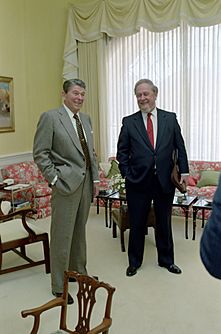
President Reagan nominated Bork for associate justice of the Supreme Court on July 1, 1987, to replace retiring Associate Justice Lewis F. Powell Jr. A hotly contested United States Senate debate over Bork's nomination ensued. Opposition was partly fueled by civil rights and women's rights groups, concerned about Bork's opposition to the authority claimed by the federal government to impose standards of voting fairness upon states (at his confirmation hearings for the position of solicitor general, he supported the rights of Southern states to impose a poll tax), and his stated desire to roll back civil rights decisions of the Warren and Burger courts. Bork is one of only four Supreme Court nominees (along with William Rehnquist, Samuel Alito, and Brett Kavanaugh) to have been opposed by the American Civil Liberties Union. Bork was also criticized for being an "advocate of disproportionate powers for the executive branch of Government, almost executive supremacy", most notably, according to critics, for his role in the Saturday Night Massacre.
Before Justice Powell's expected retirement on June 27, 1987, some Senate Democrats had asked liberal leaders to "form a 'solid phalanx' of opposition" if President Reagan nominated an "ideological extremist" to replace him, assuming it would tilt the court rightward. Democrats also warned Reagan there would be a fight if Bork were nominated. Nevertheless, Reagan nominated Bork for Powell's seat on July 1, 1987.
On October 23, 1987, the Senate denied Bork's confirmation, with 42 Senators voting in favor and 58 voting against. Two Democratic senators, David Boren (D-OK) and Ernest Hollings (D-SC), voted in his favor, while six Republican senators--John Chafee (R-RI), Bob Packwood (R-OR), Arlen Specter (R-PA), Robert Stafford (R-VT), John Warner (R-VA), and Lowell Weicker (R-CT)--voted against Bork. His defeat in the Senate was the worst of any Supreme Court nominee since George Washington Woodward was defeated 20–29 in 1845, and the third-worst on record.
The seat Bork was nominated to eventually went to Judge Anthony Kennedy, who was unanimously approved by the Senate, 97–0. Bork, unhappy with his treatment in the nomination process, resigned his appellate court judgeship in 1988.
"Bork" as a verb
According to columnist William Safire, the first published use of "bork" as a verb was possibly in The Atlanta Journal-Constitution of August 20, 1987, two months prior to the final vote: "Let's just hope something enduring results for the justice-to-be, like a new verb: Borked." Perhaps the best-known use of the verb "to bork" occurred in July 1991 at a conference of the National Organization for Women in New York City. Feminist Florynce Kennedy addressed the conference on the importance of defeating the nomination of Clarence Thomas to the U.S. Supreme Court, saying, "We're going to bork him. We're going to kill him politically. This little creep, where did he come from?" Thomas was subsequently confirmed after the most divisive confirmation hearing in Supreme Court history to that point.
In March 2002, the Oxford English Dictionary added an entry for the verb "bork" as U.S. political slang, with this definition: "To defame or vilify (a person) systematically, esp. in the mass media, usually to prevent his or her appointment to public office; to obstruct or thwart (a person) in this way."
Supreme Court Justice Brett Kavanaugh used the term during his own contentious Senate confirmation hearing testimony when he stated that "The behavior of several of the Democratic members of this committee at my hearing a few weeks ago was an embarrassment. But at least it was just a good old-fashioned attempt at borking."
Later work
Following his failure to be confirmed, Bork resigned his seat on the U.S. Court of Appeals for the D.C. Circuit and was for several years both a professor at George Mason University School of Law and a senior fellow at the American Enterprise Institute for Public Policy Research. Bork also consulted for Netscape in the Microsoft litigation.
He later served as a fellow at the Hudson Institute, a visiting professor at the University of Richmond School of Law and a professor at Ave Maria School of Law in Naples, Florida. In 2011, Bork worked as a legal adviser for the presidential campaign of Republican Mitt Romney.
Advocacy of originalism
Bork is known by American conservatives for his theory that the best way to reconcile the role of the judiciary in the U.S. government against what he terms the "Madisonian" or "counter-majoritarian" dilemma of the judiciary making law without popular approval is for constitutional adjudication to be guided by the framers' original understanding of the United States Constitution. Reiterating that it is a court's task to adjudicate and not to "legislate from the bench," he advocated that judges exercise restraint in deciding cases, emphasizing that the role of the courts is to frame "neutral principles" (a term borrowed from Herbert Wechsler) and not simply ad hoc pronouncements or subjective value judgments. Bork once said, "The truth is that the judge who looks outside the Constitution always looks inside himself and nowhere else."
Bork built on the influential critiques of the Warren Court authored by Alexander Bickel, who criticized the Supreme Court under Earl Warren, alleging shoddy and inconsistent reasoning, undue activism, and misuse of historical materials. Bork's critique was harder-edged than Bickel's, however, and he has written, "We are increasingly governed not by law or elected representatives but by an unelected, unrepresentative, unaccountable committee of lawyers applying no will but their own." Bork's writings influenced the opinions of judges such as Associate Justice Antonin Scalia and Chief Justice William Rehnquist of the U.S. Supreme Court, and sparked a vigorous debate within legal academia about how to interpret the Constitution.
Works and views
Bork wrote several books, including the two best-sellers The Tempting of America, about his judicial philosophy and his nomination battle, and Slouching Towards Gomorrah: Modern Liberalism and American Decline, in which he argued that the rise of the New Left in the 1960s in the U.S. undermined the moral standards necessary for civil society, and spawned a generation of intellectuals who oppose Western civilization. During the period these books were written, as well as most of his adult life, Bork was an agnostic, a fact used pejoratively behind the scenes by Southern Democrats when speaking to their evangelical constituents during his Supreme Court nomination process. Bork's 1971 Indiana Law Journal article "Neutral Principles and Some First Amendment Problems" has been identified as one of the most cited legal articles of all time.
Bork was also known for his disregard for the Ninth Amendment. When asked about his views on unenumerated constitutional rights during his confirmation hearings by Arizona Senator Dennis DeConcini, Bork famously compared the Ninth Amendment to an uninterpretable inkblot, too vague for judges to meaningfully enforce.In 1998 he reviewed High Crimes and Misdemeanors: The Case Against Bill Clinton, conservative pundit Ann Coulter's book on impeaching Clinton, pointing out that "'High crimes and misdemeanors' are not limited to actions that are crimes under federal law."
In 1999, Bork wrote an essay about Thomas More and attacked jury nullification as a "pernicious practice". Bork once quoted More in summarizing his judicial philosophy. In 2003, he published Coercing Virtue: The Worldwide Rule of Judges, an American Enterprise Institute book that includes Bork's philosophical objections to the phenomenon of incorporating international ethical and legal guidelines into the fabric of domestic law. In particular, he focused on problems he viewed as inherent in the federal judiciaries of Israel, Canada, and the United States— countries where he believes courts have exceeded their discretionary powers, discarded precedent and common law and instead substituted their own liberal judgment.
Bork also advocated modifying the Constitution to allow Congressional supermajorities to override Supreme Court decisions, similar to the Canadian Charter of Rights and Freedoms' notwithstanding clause. Though Bork had many liberal critics, some of his arguments have earned criticism from conservatives as well. Although an opponent of gun control, Bork denounced what he called the "NRA view" of the Second Amendment, something he described as the "belief that the constitution guarantees a right to Teflon-coated bullets." Instead, he argued that the Second Amendment merely guarantees a right to participate in a government militia, that its intent was to guarantee the right of militia membership, not an individual right to bear arms. He is quoted as saying that the gun lobby's interpretation of the Second Amendment was intentional deception, not "law as integrity," and that states could technically pass a ban on assault weapons.
Bork converted to Catholicism in 2003.
In October 2005, Bork publicly criticized the nomination of Harriet Miers to the Supreme Court, saying her nomination was "a disaster on every level."
On June 6, 2007, Bork filed suit in federal court in New York City against the Yale Club over an incident that had occurred a year earlier. Bork alleged that, while trying to reach the dais to speak at an event, he fell, because of the Yale Club's failure to provide any steps or handrail between the floor and the dais. (After his fall, he successfully climbed to the dais and delivered his speech.) According to the complaint, Bork's injuries required surgery, immobilized him for months, forced him to use a cane, and left him with a limp. In May 2008, Bork and the Yale Club reached a confidential, out-of-court settlement.
On June 7, 2007, Bork with several others authored an amicus brief on behalf of Scooter Libby arguing that there was a substantial constitutional question regarding the appointment of the prosecutor in the case, reviving the debate that had previously resulted in the Morrison v. Olson decision.
On December 15, 2007, Bork endorsed Mitt Romney for president. He repeated this endorsement on August 2, 2011, during Romney's second campaign for the White House.
A 2008 issue of the Harvard Journal of Law and Public Policy collected essays in tribute to Bork. Authors included Frank H. Easterbrook, George Priest, and Douglas Ginsburg.
Personal life
Bork was married to Claire Davidson from 1952 until her death from cancer in 1980. They had a daughter, Ellen, and two sons, Robert Bork, Jr. and Charles Bork. In 1982, he married Mary Ellen Pohl, a Catholic religious sister turned activist. Bork Jr. is a prominent conservative activist who is currently president of the Antitrust Education Project.
Bork died of complications from heart disease at the Virginia Hospital Center in Arlington, Virginia, on December 19, 2012. Following his death, Scalia referred to Bork as "one of the most influential legal scholars of the past 50 years" and "a good man and a loyal citizen". He is interred at Fairfax Memorial Park.
Selected writings
- Bork, Robert H. (1971). "Neutral Principles and Some First Amendment Problems". Indiana Law Journal 47 (1): 1–35. http://www.repository.law.indiana.edu/ilj/vol47/iss1/1.
- — (1978). The Antitrust Paradox. New York: Free Press. ISBN: 0-465-00369-9; 2nd edition (1993).
- — (1990). The Tempting of America. New York: Free Press. ISBN: 0-684-84337-4.
- — (1996). Slouching Towards Gomorrah: Modern Liberalism and American Decline. New York: ReganBooks. ISBN: 0-06-039163-4.
- — (2003). Coercing Virtue: The Worldwide Rule of Judges. Washington, DC: American Enterprise Institute Press. ISBN: 0-8447-4162-0.
- — (ed.) (2005). A Country I Do Not Recognize: The Legal Assault on American Values. Stanford: Hoover Institution Press. ISBN: 0-8179-4602-0.
- — (2008) A Time to Speak: Selected Writings and Arguments. Wilmington, DL: ISI Books. ISBN: 978-1-933859-68-2
- — (2013) Saving Justice: Watergate, the Saturday Night Massacre, and Other Adventures of a Solicitor General. New York: Encounter Books. ISBN: 978-1-59403-681-1
See also
 In Spanish: Robert Bork para niños
In Spanish: Robert Bork para niños
- Aaron Director
- Originalism
- Ronald Reagan Supreme Court candidates
- Swiftboating
- Unsuccessful nominations to the Supreme Court of the United States


